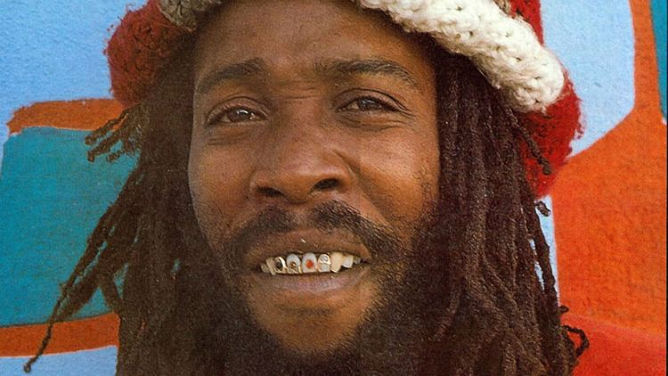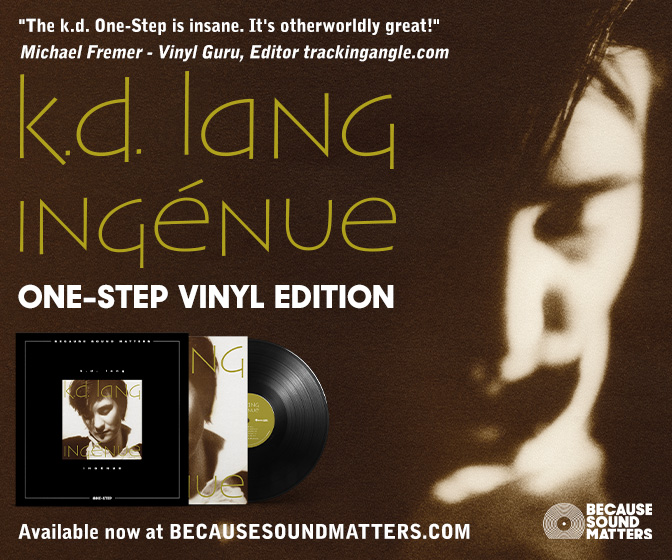Starting a Jamaican Music Collection Part 3b—The Deejays. The Start of Rap?
delving into the best of Jamaican deejay music.
In "Starting a Jamaican Music Collection Part 3a—The Deejays. The Start of Rap?" we covered four deejays—Sir Lord Comic, Count Machuki, King Stitt and U-Roy. We also posed the question "Did the deejays in Jamaica start the musical genre known as rap?" Let's dive right into this question and also highlight five more first wave deejays.
It must have been startling in the late 1960's to hear rhyming, fast talking, and jive laced lyrics all over Jamaica, but that's just what happened and indeed these deejays toasting over records were even more popular than many established artists. But this style was not created in Jamaica. In the previous segment we heard the 1927 Beale Street Sheiks' "It's a Good Thing," and The Jubalaires' 1941 "The Preacher and the Bear." Both recordings are in rap style and both predate by many years the Jamaican deejays. Now let's hear three more examples of early rap.
Joe Louis Hill was a blues singer, guitarist, harmonica player and one-man band, one of the very few one-man bands to record successfully in the 1950's around Memphis.
Joe Hill Louis 1950
"Gotta Let You Go"
Dewey "Pigmeat" Markas an entertainer who could do it all as a comedian, singer, dancer and actor. He recorded 19 albums and some singles.
Pigmeat Markham 1968
"Here Comes the Judge"
(Reached #19 on the Americn charts and #4 on the U.S. R&B charts. Also peaked at #19 on the U.K. charts.)
Louis Jordan was an American saxophonist, multi-instrumentalist, songwriter and bandleader who was popular from the late 1930's to the early 1950's. Known as "the King of the Jukebox," he has been cited (among others) as recording the first rock and roll record. In 1987 he was inducted into the Rock and Roll Hall of Fame as an "early influence." Jordan was extremely successful from 1941 to 1951 with 51 top 10 hits on the U.S. R&B charts (including 19 that reached #1) as well as 19 that made the top 25 on the U.S.pop charts.
Louis Jordan from the 1946 musical Beware.
"You Gotta Have a Beat"
In part 3a of this article we promised the great U-Roy would weigh in on who was the first rapper. Here is what he had to say in this unfortunately very short clip.
So where does this leave us in the discussion of the birth of rap? The Beale Street Sheiks were rapping as far back as 1927 and the other four examples are also pure rap. But the difference here is those, for the most part, were "one offs" or novelties. For the Jamaican deejays this was 24 hours a day, 365 days a year business. They single handedly created a genre that has exerted a 50 year influence on the world's music. And U-Roy, although not the first on the island, is the one most responsible for its flowering. The general consensus is the first two rap records here in America are the Fatback Band's "King Tim III (Personality Jock)" and the Sugarhill Gang's "Rapper's Delight," both released in 1979.The deejays in Jamaica were toasting over records ten years earlier.
From an article in the Jamaican Gleaner in 2021
When U-Roy was still known as Ewart Beckford, he would sneak out to dances to listen to Count Matchuki and King Stitt toasting Kingston sound systems and practice his cries of “Wow!” and “Yeah yeah!” in his grandmother’s bathroom. Aged 15, he overcame his shyness to introduce the singers on Dickie’s Dynamic system. A fan of Louis Jordan and Louis Prima, he evolved his jive-talking style to move up in the sound system world to the stellar company of Coxsone and King Tubby. As he told it: “I used to practice hard, like a footballer who loves the ball – whenever he wakes up he’s on that ball. That was me – whenever I hear music I started toasting in my head and it was the most joy I could get at that time. The thing was to work with the record, you didn’t want to crowd the singer or t’ing like that. You talked in between the lines, you didn’t have to say much at all, but when you add your bits to a record it became personal to that crowd at that time – their record. A good deejay could make a sound system famous."
There are five more first wave Jamaican deejays waiting in the wings. All are unique and mandatory listening if you want to know the history of Jamaican music, seen? Let's go!
Dennis Alcapone
U-Roy's main rival at the dawn of the 1970's was Dennis Alcapone (b. Dennis Smith in 1947) Taking his name from the famous American gangster, he enjoyed enormous success, cutting over 130 songs for many producers, mostly Duke Reid, Coxsone Dodd and Bunny Lee between 1970 and 1973. Like many other early deejays, he began his career on a sound system, El Paso Hi Fi in 1967-68. Named after the wonderful Marty Robbins' song, it showed, to me at least, that Dennis had excellent and wide musical taste for a young man. As for how he got his nickname, this from an interview by Angus Taylor in 2009. Dennis was the first deejay to use a gangster name.
"Well that name arrived from us going to the cinema one night to watch a movie with Rod Steiger - an Al Capone movie (Al Capone, 1959.) Coming home from the theatre we were joking and acting out the film when someone commented that I was going on like Al Capone. (laughs) The guys them started laughing and I remember I woke up the following day with the name Alcapone!"
A.T.: There is a lot of media furor over gangsterism in music today. Has it always been so or are things different now?
D.A.: Things have changed a lot. Because when we did music we did with a lot of love and respect. We entered the music for the love of it and we did music for the love of it. We didn't do it for the gains that are presently in the business. You know there's a lot of money floating around, and there is a saying, "where there's money there's muck." There's a lot of muck in the music at the moment. People doing derogatory lyrics, talking about gun lyrics and all kinds of discrimination. It's a different era - and it's not just in the music industry. It's unfolding around you every day in all walks of life. Everything changed. You see kids killing kids. We didn't experience that when I was growing up. I never saw a kid kill another kid when I was growing up. If it happened it happened very rarely. That was not something that happened like what's happening around us now. The whole world has changed. You didn't see people strapping bombs on themselves and blowing up themselves. Killing now is just becoming like the norm. When I was growing up, when someone died it was a big thing but now it's like an everyday thing. So the whole world is revolving. It's like a different time we're living in. A perilous time. You leave out your home. you're not sure to come back because you don't know who you're going to meet out on the street. Because people are just cold hearted."
Once heard, Dennis' style is unforgettable. Whereas U-Roy had mostly a fast talking jive laced style, Dennis was more like half talking, half singing, peppered with loud high pitched "whoas" and "yeah, yeah yeahs" that kept the songs overflowing with excitement and energy.
Here is an early video of Dennis at the Edinburgh Festival in 1973. "Cassius Clay" is a version of Jackie Mittoo's amazing "Drum Song," and "Wake Up Jamaica" is taken from Joy Landis' "Moonlight Lover."
In 2018 Dennis was awarded the Royal Medal of Appreciation by Prime Minister Andrew Holness for his "contribution to the growth and development of various facets in Jamaican life."
His two must have albums are Forever Version and Guns Don't Argue, both all killer, no filler. A joy from beginning to end. For a first pressing of the former, Discogs lists four in VG to VG+ condition for from $65 to $180. One has a generic cover, one has no cover. As I've mentioned quite a few times in past articles, early Jamaican first pressings from the 1960's to the mid 1970's are risky business to buy without first hearing the actual vinyl. The quality of records being produced there left a lot to be desired if you want perfection. So I'm recommending a Deluxe Edition CD that adds six tracks to the original twelve, all transferred from the master tapes. Plenty available on Discogs in M condition and it will only set you back $20.
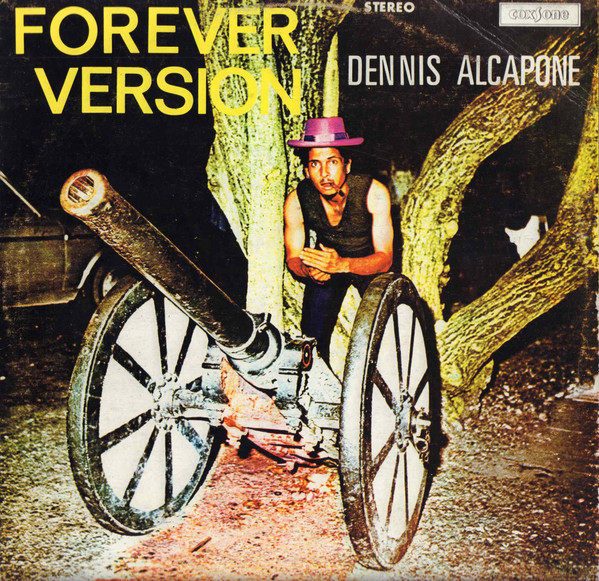 Originally issued on Coxsone Records in 1971. Deluxe Edition CD released in 2007 on Heartbeat Records.
Originally issued on Coxsone Records in 1971. Deluxe Edition CD released in 2007 on Heartbeat Records.
"Nanny Version"
(Dennis breaks Larry Marshall's famous love song, "Nanny Goat," into two parts. First, sad but true, heartfelt words." Nobody knows you when you're down, brother/You gotta stay on top of the musical cream of the crop/Forget about it!/When you ain’t got no money, brother/You ain’t got no friend/That’s when your friendship ends/Say that's when you hafta start all over again." And in the second part Dennis echoes Marshall's love sentiments. A total success to open this perfect album.)
"Riddle I This"
(Versioned over Derrick Harriott's 1967 rock steady classic, "Solomon," which we heard in part 2a of our survey. "I am wiser than Solomon/So girl don't play no tricks/Just be calm and be still/Don't run me down for my bread/You wasn't around when I was slaving myself/Girl leave Sol alone/'Cause I'm a big man in this town." Both Derrick and Dennis at the height of their powers on this perfect track.)
"El Paso"
(Dennis always sought out the best riddims (as they say in Jamaica) to sing over and Coxsone Dodd at Studio One had some of the best. We've already heard this rhythm in part 2a of our survey-- Rock Steady The Singers used by Slim Smith in his soulful song "You Don't Care." Here Dennis completely strips out the vocals in tribute to his youthman years running the El Paso sound system. Included as one of the bonus tracks on the Deluxe CD.)
The other indispensable album by Dennis Alcapone is Guns Don't Argue. Ten first pressings on Trojan listed on Discogs ranging from $45 to $105. Conditions range from G+ to VG+. The seller of the one in VG+ is asking a little over a C-note and says "Perfect copy--clean labels no writing on cover!" That could be a possibility for someone wanting an all analog first pressing. But for those with a limited budget, I'd go with the CD reissued from the master tapes since that label does an excellent job with the transfers. Only drawback is they used a different cover than the original on the Trojan label. Plenty of CD's on Discogs in M condition and it will only set you back $20. Grab one! The booklets that accompany all Jamaican Gold CD's are exemplary too.
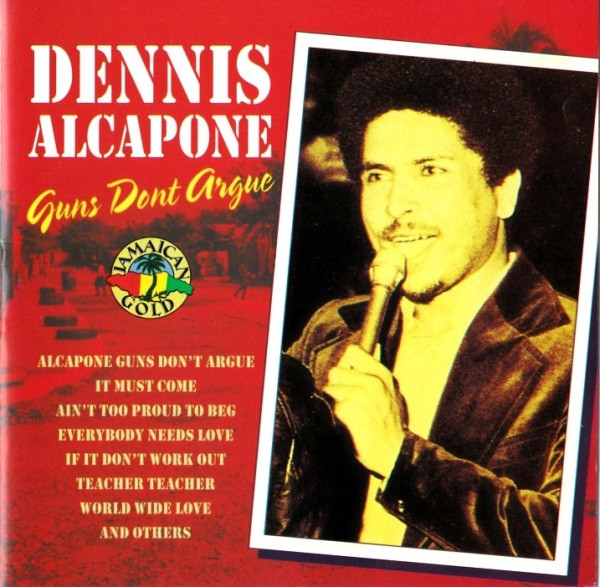 Originally issued on Trojan Records in 1971. CD on Jamaican Gold released in 1993
Originally issued on Trojan Records in 1971. CD on Jamaican Gold released in 1993
"Guns Don't Argue" is Dennis Alcapone's most famous song and rightly so; it is simply irresistible, voiced over a much loved 1971 song by Eric Donaldson titled "Love of the Common People." Since this is one of the all time great songs and versions let's hear both.
"Love of the Common People"
"Guns Don't Argue:
(Baby Face Nelson and Pretty Boy Floyd are referenced as two sidekicks but Dennis is not glorifying violence ."Don't offend 'cause I, Al Capone, will defend." And later in the song "Don't let the children cry/Or you'll have to tell Al Capone why/My barker will drop you!/ Don't call me Scarface, my name is Capone/ C A P O N E, Capone") Ha ha. This wonderful deejay is so creative!
"Everybody Needs Love"
(The Temptations made this song famous in the 1960's. This version's rhythm is taken from Slim Smith's cover, but the girl singing here is Doreen Shaffer.)
"It Must Come"
(Based on Delroy Wilson's classic "Better Must Come")
Big Youth
Whew! Tough act to follow, eh? But the next deejay was more than up to the task. When his debut album, Screaming Target, came out in 1972 all my reggae buddies knew this was something special. We all owned it, played it every single everyday and never tired of it--it was that fresh and compelling. It really was the talk of our circle in New York town.
Born in 1949 as Manley Augustus Buchanan, Big Youth (aka Jah Youth due to his early songs championing Rastafari beliefs) left school at age 13 and began working as an auto mechanic. How he began singing is quite unusual. Big Youth was working on building the Sheraton Hotel in Kingston (now it has a different name) when the crew discovered he could build diesel engines so he got to work in the elevator shafts. When he was in the shafts he'd sing out "Yo yo yeah?" It would echo back.and the man knew then what he wanted to do. The acoustics were like having delay, echo and reverb, just what a deejay loves.
Tippertone sound system was where Big Youth got his start and his conscious, truthful lyrics were flying in the face of many other deejays at the time. As he explained, many deejays were just "Yean yeah yeah baby baby woo." (Laughing as I'm typing this.--W.L.) In light of what came before, it must have been startling to hear lyrics about Jah and Marcus Garvey and see Big Youth, with red, green and gold gems embedded in his front teeth, violently shaking his dreadlocks when singing, but the buying public liked what they heard and Big Youth soon had seven songs on the Jamaican charts.
There is a wonderful black and white photo of Big Youth with the Sex Pistols' Johnny Lydon and Lydon is blowing out a huge white cloud of smoke from a spliff. British youth were seriously buying Jamaican music quite a few years before the American public. Uptempi early reggae was the choice of music for Britain's white youth skinheads in the late 1960's. Indeed, between 1968 and 1971, more than 20 reggae singles made the U.K. pop charts, two of them, Dave & Ansel Collins' "Double Barrel" in 1970 and Desmond Decker's "The Israelites" in 1969 reaching #1 in England. Lydon was not a skinhead but obviously liked Jamaican music. In 1978, on an all expenses paid trip to search for talent for Virgin's Front Line label, he visited the island, meeting many famous artists. With his anti-establishment attitude he was embraced by the Rastafari who felt a kindred spirit. He also became friends with two of the most famous deejays, I-Roy and Big Youth. Smoking a chalice with both must have been an unforgettable moment for the then 22 year old Lydon.
Before we recommend an album and hear some tracks, let's see a short clip of Jah Youth in his prime.
His chanting style on his debut album, Screaming Target, set the standard for many years to come. Produced by the 20 year old Gussie Clarke, the LP featured a selection of songs from Gregory Isaacs, Leroy Smart, K.C. White, Dennis Brown, Lloyd Parks and others that was impeccable.
Discogs has four Jamaican first pressings for sale ranging in price from $38 to $150. The most expensive one is VG+, ships from U.S.A, and sounds like it might be OK but keep in mind it is a Jamaican pressing from 1972 so that raises some alarms. The next year it was released on Trojan and there are seven available from $82-$112. That might be a safer choice. Trojan released CD in 2001 and 2006 and you easily pick up a M copy for $20 since there are many for sale. Avoid the 1996 CD--it separated the vocals with disastrous results. My choice would be a 2014 CD on Trojan that adds fourteen tracks (including the original source songs) to the album's ten. For sale on Discogs from $19-$36.
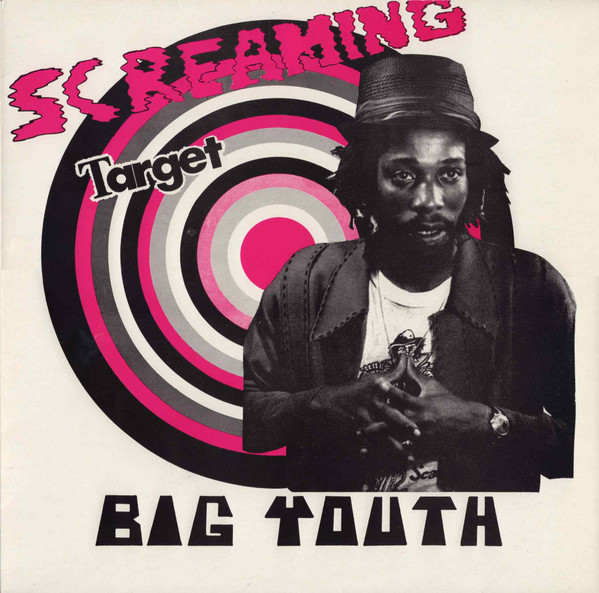 Originally released on Gussie in 1972.
Originally released on Gussie in 1972.
Hard to pick only three songs from this superb album. No joke, every song is excellent.
'Screaming Target"
(Over Dawn Penn's rock steady classic "You Don't Love Me," aka "No No No," Big Youth drops an epochal track. In the opening dialog, mentioning is made of two just seen films in Jamaican theaters--the first Dirty Harry movie and Screaming Target (actually titled Sitting Target) and one might expect the ensuing lyrics to have a violent bent with plenty of guns and killings, or at least a boastful outburst about being the greatest or the toughest. But Big Youth, in a stroke of righteous genius, turns the song into a plea for literacy and the need for education to make a better society. "Come on down an' let me hear you what you say/When you come to say Scatting/Baby, come an' say to your own man/An' when you doin' that (Look at that)/When you do that, have to be great/An' baby, that you would appreciate/Beg you, come on down an' don't you be the two illiterate/Illiterate, it is a thing that you should go an' wait/You got to go an' come (No, no, no)/You should never be a fool/No-no-no, not at all/No-no-no, you should go to school an' learn the rule/Illiterates seek classes all around, as I would say/So you can go to illiterate place/An' so you can come to get civilized/Wow baby, won't you come on and realize, as I would/-As I would really-really (Ow)/As I would really-really (Huh) The song stayed on the Jamaican top 20 charts for over a year.)
"Pride and Joy Rock"
(Over the wonderful "Pride and Joy" by Leroy Smart.)
"Honesty"
(The earliest Jamaican deejays would simply interject their lyrics over a song while keeping some of the original track. But gradually they stripped out all the lyrics and replaced them with their own. A fine example of this is "Honesty" which keeps the rhythm of Lloyd Parks' "Slaving," but discards all the lyrics.)
I-Roy
Born Roy Samuel Reid in St. Thomas Parrish, Kingston in 1944, I-Roy started as an accountant for the government before moving into music, honing his craft on many sound systems,including Son's Junior, Stereo, Ruddy's Supreme, V-Rocket and King Tubby's Hi Fi. As we've recounted before, these sound systems were part street party, part club and put the deejays in close proximity to the crowds, possibly accounting in part for their vast popularity with the record buying public.
I-Roy's lyrics are witty and intelligent. Cleopatra, Florence Nightingale Stokely Carmichael, Mickey Spillane and Alfred Hitchcock are just some of the names appearing in his songs. Around the time his first two albums were released he spent several months in London working with Sir Coxsone's sound system and became popular with both England's West Indian and black British communities..Indeed, the great dub poet and writer Linton Kwesi Johnson.mentioned I-Roy in his song "Street 66," with "the mighty poet I -Roy" being "on de wire." (More on Johnson when we come to the flowering of reggae in England part of our survey.) .
From a 1979 interview by Ray Hurford published online by Reggae Vibes magazine.
"It all happened out of boredom, like I was always a music lover, I loved the Blue people like Louis Jordan. All the inspiration came then because I used to go to places like Bournemouth and listen to the early discos.
Sound system then play Smiley Lewis, Joe Turner, Fats Domino, plus early Ska that was coming through. So being a cat that had just graduated from college, I was looking for something freer to do, which would take less of my time and give me more air. It’s a summer country, and it’s too much shirt and tie thing. Go to work at 8 in the morning and finish at 4.30 in the afternoon. In those days you didn’t have air conditioning, you would find 40-50 in an office, and it was so hot and sticky.
In those days it was just Lord Comic and King Stitt, U Roy, Count Matchuki and a guy who called himself Sir George The Atomic. Sound System was the now thing in Jamaica. I loved it, you know, so I became involved. Then wherever I played, there were a few who would say why don’t you record. U Roy had “Wake The Town” and “Wear You To The Ball.” I used to play on a lawn called Hocky Wocky, and Harry Mudie who had his Disco then and this small record shop, he came and listen to me, and then as he was a producer… because I had moved over from Kingston to Spanish Town, he said he wanted to produce me, and after two days of negotiation we went into the studio and did my first three records. They were “Musical Pleasure," “Let Me Tell You Boy” and “Drifter” and they are still selling in the shops. They are the oldest talking records that keep on selling, and it went on.
I did “Hot Bomb” for the late Lloyd Campbell, me and Derrick Morgan. Derrick had the tape and I had the voice. Then I did my first album for Gussie Clarke – Presenting I-Roy with tracks like “Black Gold and Green," “Coxsone Affair,” “Black Man Time,”“Cow Town Skank,” all the early hits. One of the confrontations that I suffer is that a lot of people think I imitate U Roy. And it’s not like that. We are two completely different persons with completely different ideas, because I ‘m always attacking the democratic standard of living, licking out on some of the wrongs of society. Some of the dissatisfactions. And at the same time, I can give you a few jokes, a few rude lyrics like “Teapot” and “Welding” and it’s just been like that, a lot of time people get the wrong impression."
There are no live videos of early I-Roy but there are two short interviews.
I-Roy's debut album, Presenting I-Roy, like Big Youth's debut, was produced by Gussie Clarke and has wonderful rhythms too. Discogs has seven copies on Trojan from VG+ to M- with prices from $38-$73. Quite a few repressings from 1976 are also available. A good choice for those who don't mind digital sound is the 2007 CD on Trojan which adds eleven tracks to the twelve on the original album and is only in the $20 range on Discogs. I-Roy's second album, Hell and Sorrow, is just as good as his debut.
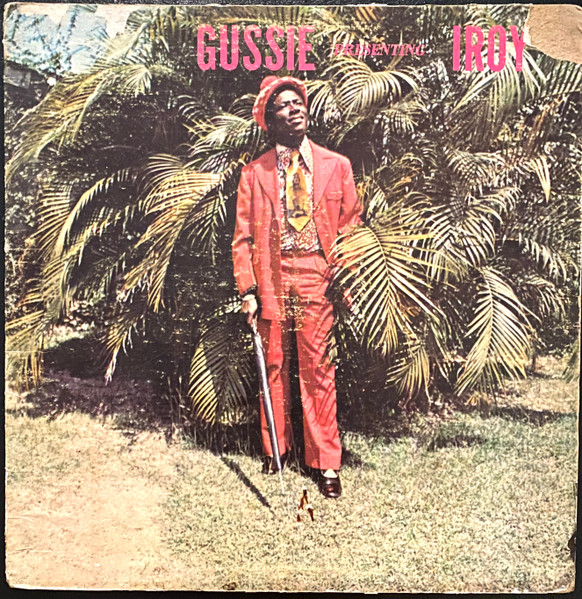 Originally issued in 1973 as Presenting I-Roy on Trojan in the U.K. and as Gussie Presenting I-Roy in Jamaica.
Originally issued in 1973 as Presenting I-Roy on Trojan in the U.K. and as Gussie Presenting I-Roy in Jamaica.
"Red, Gold And Green"
(From Ken Boothe's "Red, Green and Gold.")
"Black Man Time"
(Sung over the Lloyd Parks' "Slaving." rhythm.)
The song begins with a dialog between "Little Youth" and I-Roy.
Little Youth: "Hail star! The man name I-Roy?"
I-Roy: "Sight! Sight!"
Little Youth: "I-man a-hear the man a play Tubby's Hi-Fi more time."
I-Roy:" Yeah, well, King Tubby's sound really wild, mi a tell you youth, you know!"
Little Youth: "I-man a-beg the man a ten cent, you know."
I-Roy: "Ten cent..."
Little Youth: "Yeah, I-man a-buy a stick, you know."
I-Roy: "Well, right now, I man no support that, but if is food, I-man give food for thought. Hear sah!"
Little Youth: "Love you still! Forward! More time!"
I-Roy: "Love, youth!"
The following is from the I-Roy interview in 1979 posted on Reggae Vibes where he describes the song.
"Take “Black Man Time,” the youth came up to me and say “Hail Star, the man named I Roy, I man sight the man play Tubby’s more time. You know star, the man sound hard you know.” That’s a way of boosting you up, you know, like a man make you feel good, to beg you something, then the he say, I man beg the man ten cents. So I say to him, ten cents? He replies, I man want to buy a stick of Ily. I say, right now I man naw support that. Now you know it’s not the weed I mean, or the Ily, but the begging. So I say, but I give food for thought. Because the weed is food for thought. That was the parable that a lot of people never dig into, he got the money, and him say, love still, but if him didn’t get it, he would be disappointed. That was a parable for the persons, who had their wits who could put it together, and say yeah, it gave food for thought. Ily is not food for the belly."
"Melinda"
(I-Roy had the best rhythms to toast over. Here it's Alton Ellis' "Breaking Up.")
Scotty
Born David Scott in Westmoreland, Jamaica, Scotty began performing as a singer in the rock steady/reggae group The Federals, enjoying a hit in 1967 with their first 7" single, "Penny For Your Song." But the group did not enjoy lasting success and broke up in 1969 with Scotty going on to join The Chosen Few, a reggae group with five albums and forty singles. He later deejayed over Crystallites' rhythms for Derrick Harriot, his first DJ outing being "Musical Chariot." He appeared on numerous charting hits during this period, such as "Sesame Street," #3 on the 1970 Jamaican charts, "Riddle I This," #1 in 1970 and "Jam Rock Style" in 1971.
Scotty is best known for his song "Draw Your Brakes" in Perry Henzell's film The Harder They Come," along with Bob Marley and the Wailers album Catch A Fire," the two most important vehicles breaking reggae music to a worldwide audience.
Scotty's 1971 debut album, School Days, is the one to own but as of this writing there are only four listed on Discogs, the only one worth owning in VG+ is almost $100. So go for the LP compilation Unbelievable Sounds. It includes most of the School Days LP plus five. extra tracks. Discogs has plenty in VG+ to M- for from $30 to $63. The $30 one ships from USA and is M-
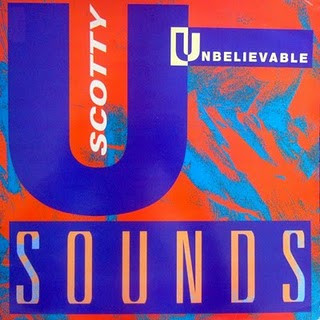 Issued on Trojan Records in 1988.
Issued on Trojan Records in 1988.
"Children Children"
(Sung over Keith & Tex's rock steady track "Tonight."
"Draw Your Brakes"
(Another Keith & Tex rock steady song, "Stop That Train."
"Sing Along"
(From Rudy Mills' "A Long Story," another wonderful rock steady song. How can you resist Scotty when he has these super catchy rock steady songs to toast over?)
Prince Jazzbo
Born Linval Roy Carter in 1951 in Clarendon Parish but raised in Kingston Jamaica, Prince Jazzbo was a deejay at sound systems such as The Whip in Spanish Town. He began recording with Coxsone Dodd's Studio One label in the early 1970's under the name Prince Jazzbo, and also recorded for Glen Brown and Lee "Scratch" Perry. (We referenced his amazing collaboration with Perry, the song "Blood Dunza," in part of our Starting A Jamaican Music Collection. It is a track from Ital Corner, one of the greatest deejay roots albums ever.) He went on to work on his own releases with Bunny Lee in collaboration with many artists as a vocalist and producer for labels including his own, Ujama. The Prince achieved his greatest success in the roots reggae era when his distinctive deep gruff voice fit the mood perfectly.
Jazzbo continued to release new material right up to his passing from lung cancer in 2013 The man's total love of music comes shining through in this quote from reggae historian Beth Lesser's book Rub-a-Dub Style.
"I never even thinking of making records. I just love music. I never know I could make records much less know about traveling and all like that. It wasn’t about that! It was about loving the music. We play all night and never get money. But we get food and we get drink and we get herb and people respect us. Everywhere you go, people say, "Jazzbo! Where you a play tonight?" And that was nice. You could go anywhere. Everybody know you. You are not a "wrong do-er." Bad man like you. Police like you. Thief like you-- everybody like you. You live free."
The one album he recorded in the early 1970's, Choice Of Version, for some reason was not released by Coxsone Dodd until 1992. A pity--it would have put him right in the upper tier of early Jamaican deejays, alongside U-Roy, I-Roy, Dennis Alcapone and Big Youth.
Choice Of Version has been repressed quite a few times and there are currently nine available on Discogs in VG+ to M- with prices from $40-$63
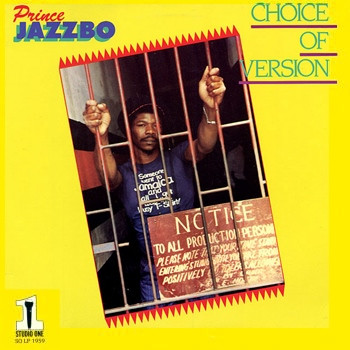 Originally recorded in the early 1970's. Album on Studio One released in 1992
Originally recorded in the early 1970's. Album on Studio One released in 1992
"Imperial I"
(Toasted over "Door Peep Shall Not Enter" from Burning Spear's 1973 groundbreaking debut album, Presenting Burning Spear. More on the extraordinary Burning Spear group when we come to part 4b of our survey-- Roots Reggae.)
"Fire Coal Version"
(Sung over "Fire House Rock" from the Wailing Souls' great eponymous LP. Like Burning Spear, more on The Wailing Souls coming soon.)
"Fool For Love".
(Dawn Penn's excellent 1967 rock steady track, "You Don't Love Me," aka "No No No" is again versioned here.)
Albums and CD's recommended in this article.
Dennis Alcapone Forever Version
Guns Don't Argue
Big Youth Screaming Target
I-Roy Presenting I-Roy
Hell and Sorrow
Scotty School Days
Unbelievable Sounds
Prince Jazzbo Choice Of Version


